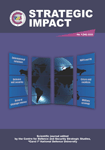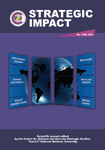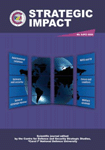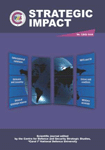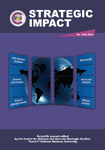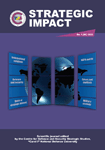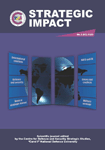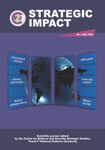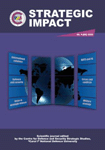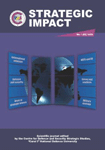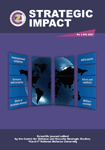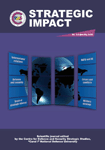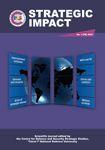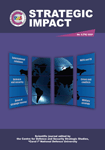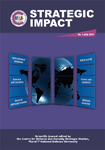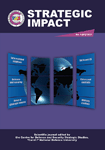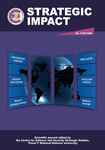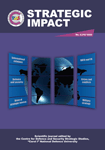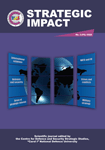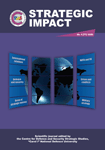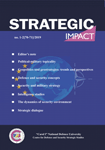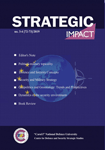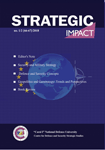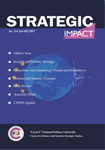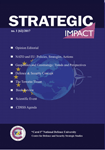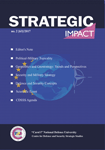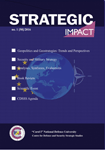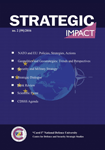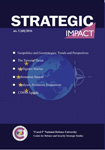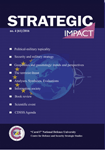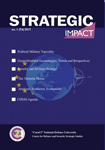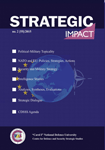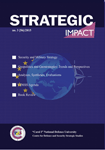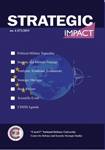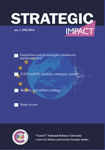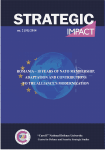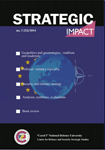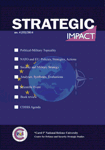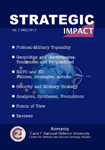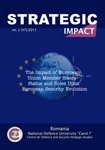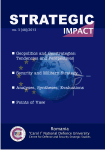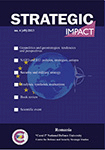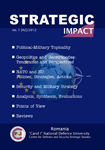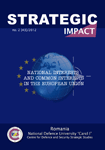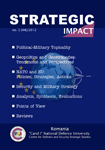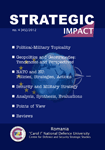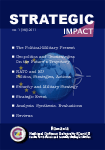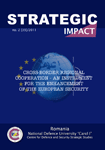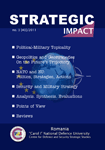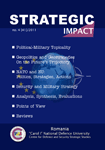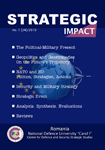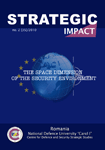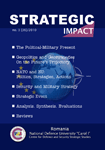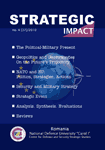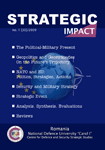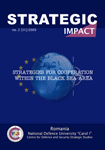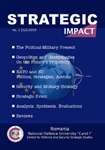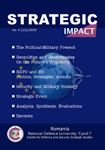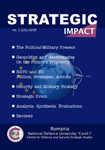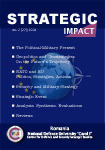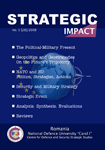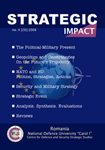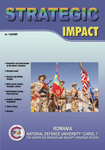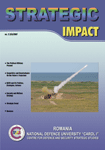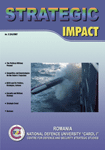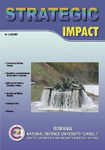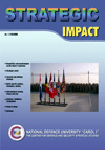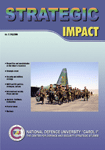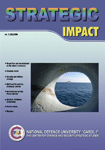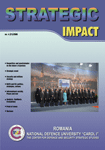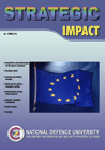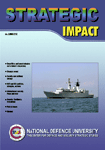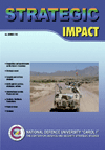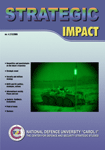Strategic Impact is the academic open access quarterly, edited by the CDSSS in Romanian since 2001 and in English since 2005. Starting with issue no. 1/2023, the journal is published in the English language only.
The quaterly publishes strategic level analyses, syntheses and evaluations, but also points of view analyzing the defence and security impact of the national, regional and global dynamics falling the following topics: political science; international relations; geopolitics, geoeconomy and geostrategy; the political-military sphere; international organizations - with a focus on NATO and the EU; information society and cyber security; intelligence studies and military history.
Strategic Impact collaborates with leading figures in the field of national and international scientific research and military and civilian higher education, from the Ministry of National Defence, Defence Staff, military services, Ministry of Internal Affairs, Ministry of Foreign Affairs, military units and other state institutions, non-governmental organizations, companies, etc.
Editorial Council
Eugen MAVRIȘ, PhD, "Carol I" National Defence University (NDU), Romania, Chairman
Ștefan-Antonio DAN-ȘUTEU, PhD, Associate Professor, NDU, Romania
Florian CÎRCIUMARU, PhD, Lecturer, Centre for Defence and Security Strategic Studies (CDSSS), NDU, Romania
Marius ȘERBESZKI, PhD, Associate Professor, "Henri Coandă" Air Force Academy, Romania
Pavel ANASTASOV, Operations Division, NATO HQ, Belgium
Robert ANTIS, PhD, National Defence University, USA
Virgil BĂLĂCEANU, PhD, Honorary President of the Association of Reserve Officers from Romania
Răzvan BUZATU, PhD, Chairman of the Research Task Group on Strategic Awareness of Energy Security, NATO Science and Technology Organization
Andreea STOIAN-KARADELI, PhD, Associate Professor, College of Liberal Arts, University of Texas Rio Grande Valley, USA
Augustin-Emilian CHIREA, Acting Military Representative of Romania to NATO and EU, Belgium
John L. CLARKE, PhD, Professor, George C. Marshall European Center of Security Studies, Germany
Piotr GAWLICZEK, PhD, Associate Professor, NATO DEEP eAcademy Director, University of Warmia and Mazury in Olsztyn, Poland
Andrzej LIS, PhD, Director of Doctrine and Training Centre of the Polish Armed Forces, Poland
Pavel NEÈAS, PhD, Professor Eng., Matej Bel University, Slovakia
Andrzej PIECZYWOK, PhD, Professor, Kazimierz Wielki University, Poland
Josef PROCHÁZKA, Eng. PhD, Associate Professor, Director of the Centre for Security and Military Strategic Studies at the University of Defence, Czech Republic
Florian RĂPAN, PhD, Professor, Military Technical Academy "Ferdinand I", Romania
Igor SOFRONESCU, PhD, Associate Professor, "Alexandru cel Bun" Military Academy, Republic of Moldova
Mariusz SOLIS, NATO DEEP Coordinator, Belgium
Péter TÁLAS, PhD, National University of Public Service, Hungary
John F. TROXELL, Research Professor, Strategic Studies Institute, US Army War College, USA
Šliwa ZDZISŁAW, PhD (Habil.), Dean at Baltic Defence College, Estonia
The quaterly gathers together a Scientific Board of academic professors and researchers who evaluate the scientific content of the submitted papers according to double blind peer review process. Previous to the evaluation, the papers are subject to a process of anti-plagiarism analysis.
Scientific Board
Stan ANTON, PhD, The Association of Romanian Reserve Officers
Mirela ATANASIU, PhD, Senior Researcher, CDSSS, NDU, Romania
Cristian BĂHNĂREANU, PhD, Senior Researcher, CDSSS, NDU, Romania
János BESENYŐ, PhD, Associate Professor, Óbuda University, Hungary
Cristina BOGZEANU, PhD, Associate Professor, "Mihai Viteazul" National Intelligence Academy (NIA), Romania
Emil-Sorin BUCUR, PhD, Military Adviser, Permanent Mission of Romania to the United Nations, USA
Ruxandra BULUC, PhD, Senior Researcher, National Institute for Intelligence Studies, NIA, Romania
Mihaiela BUȘE, PhD, Associate Professor, Security and Defence Faculty (SDF), NDU, Romania
Ion CHIORCEA, PhD, Professor, Naval Academy "Mircea cel Bătrân", Romania
Cristian CONDRUȚ, Teaching Assistant, NIA, Romania
Maria CONSTANTINESCU, PhD, Associate Professor, Regional Departament of Defense Resources Management Studies (DRESMARA), NDU, Romania
Libor FRANK, PhD, Lecturer, University of Defence, Czech Republic
Daniela-Elena HRAB, Senior Instructor, Command and Staff Faculty (CSF), NDU, Romania
Cristian ICHIMESCU, PhD, Associate Professor, SDF, NDU, Romania
Vasile-Ciprian IGNAT, PhD, Associate Professor, SDF, NDU, Romania
Crăișor-Constantin IONIȚĂ, PhD, Researcher, CDSSS, NDU, Romania
Neculai-Tudorel LEHACI, PhD, Professor, CSF, NDU, Romania
Daniela LICĂ, PhD, Researcher, CDSSS, NDU, Romania
Ecaterina Elena MAȚOI, PhD, Middle East Political and Economic Institute, Romania
Constantin MOȘTOFLEI, PhD, Senior Researcher, former Director of CDSSS
Adi Marinel MUSTAȚĂ, PhD, Professor Habil., SDF, NDU, Romania
Veronica Marilena PĂSTAE, PhD, Lecturer, SDF, NDU, Romania
Petrișor PĂTRAȘCU, PhD, Associate Professor, CSF, NDU, Romania
Marius PĂUNESCU, Associate Professor, SDF, NDU, Romania
Dan-Lucian PETRESCU, PhD, Lecturer, CDSSS, NDU, Romania
Alba-Iulia Catrinel POPESCU, PhD, Associate Professor, National Defence College, NDU, Romania
Florin POPESCU, PhD, Associate Professor Eng., SDF, NDU, Romania
Maria-Magdalena POPESCU, PhD, Professor Habil., SDF, NDU, Romania
Ciprian PRIPOAE-ȘERBĂNESCU, PhD, Associate Professor, SDF, NDU, Romania
Daniel ROMAN, PhD, Associate Professor, CSF, NDU, Romania
Alexandra-Mihaela SARCINSCHI, PhD, Senior Researcher, CDSSS, NDU, Romania
Elena ȘUȘNEA, PhD, Associate Professor, SDF, NDU, Romania
Dănuț TURCU, PhD, Professor, SDF, NDU, Romania
Cezar VASILESCU, PhD, Professor Habil. Eng., DRESMARA, NDU, Romania
Mihai Vladimir ZODIAN, PhD, Researcher, CDSSS, NDU, Romania
Peer review process
The scientific evaluation of the articles proposed for publication in Strategic Impact is developed according to the principle double blind peer review, in two stages: pre-evaluation and evaluation.
Pre-evaluation
The pre-evaluation process consists in the verification by the editorial staff of the following aspects:
• Whether or not the theme of the article is in line with the subjects dealt by the jounal;
• Whether or not it complies with the standards of a scientific article (structure, methodology and research hypothesis, relevant bibliography);
• If it is suspected of plagiarism (following the interpretation of the similarity report);
• Whether it complies with the editorial standards adopted by the journal.
In case the paper does not comply with the thematic area of the journal, does not meet the standards of a scientific article or presents evidence of plagiarism, it is rejected.
In case all of the requirements are met, the article is forwarded to an evaluator with expertise in the field of the paper.
Evaluation
The evaluation process is developed electronically, according to the principle double blind peer review, meaning that the author's identity is not known by the evaluator(s) and the name of the evaluator(s) is not made known to the author.
According to the Guide for evaluators, they keep a close watch on the following: quality of the scientific content, structure, originality of the paper and its conclusions; article's length from the perspective of the ideas approached and their argumentation; scientific language; relevance of article's theme for the international scientific community; adequacy of title, abstract and keywords for the article's content; utility of tables and figures; a relevant bibliography comprising recent and prestigious specialized works.
The evaluators can make corrections or comments on the text with the aim of increasing scientific quality of the article (for example, they may require: conceptual articulation, re-phrasings or additions, data or arguments in support of the analysis). The evaluator will also complete a form, which sets out a number of conclusions and general comments, as well as the underlying arguments.
Consequently to the evaluation, there are three possibilities:
a) the article is accepted for publication as such or with minor changes;
b) the article may be published if the author makes recommended improvements;
c) the article is rejected.
The editorial office receives the article evaluated electronically, together with the evaluation form and passes on the conclusions and remarks of the evaluation to the author.
In case the article is accepted for publication, provided the author makes the recommended changes, the editorial office shall provide the author a deadline for submitting the amended article. This stage involves sending the paper reviewed by the author to the same evaluator, in order to obtain his/her approval regarding the content.
The editorial staff deals with linguistic revision and editing of the article, in order to be published.
Paper submission
Articles shall be sent to impactstrategic@unap.ro as follows: 15th of December (No. 1); 15th of March (No. 2); 15th of June (No. 3); and 15th of September (No. 4).
The Guide for Authors can be accessed here:![]()
Strategic Impact ISSN print: 1841-5784, e-ISSN: 1842-9904, ISSN-L: 1841-5784 E-mail: impactstrategic@unap.ro, Website: https://cssas.unap.ro/en/si.htm |
The quaterly is a prestigious scientific journal in the field of Military Science, Information and Public Order according to the National Council for the Recognition of University Titles, Diplomas and Certificates (CNATDCU) and indexed in the following international databases:








